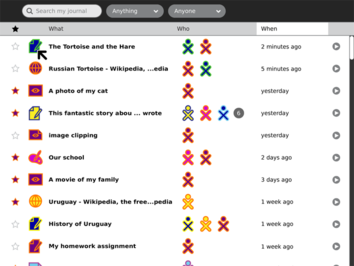OLPC in Paraguay educates both little kids and teenagers
Sugar is an educational graphical computer environment specifically developed for collaborative learning in primary school. Initially, Sugar was developed and only used within the famous One Laptop Per Child project (OLPC) launched by Nicholas Negroponte to make special laptop computers, called XO, available to the children of all developing countries. (follow the link to see an Example of the Sugar graphical interface.

Today, however, Sugar is usable on any computer running Linux, Mac OS or Windows. Since some months ago I had described how the XO laptop is used in some Nepali schools, this time I interviewed Bernie Innocenti, an italian developer who worked on that project and now is doing the same thing in Paraguay.
Stop: Bernie, how is the development of Sugar going?
Bernie: Sugar 0.88 contains many new features, including support for fast Internet connections via GSM phones and new versions of educational applications like Club de Othello and Turtle Art. By the end of the month even the portable version on USB key should be available. Besides, Sugar 0.88 is already available as binary package for Ubuntu Lucid, Fedora 13 and other Linux distributions that should be released in this period.
Stop: What about the whole OLPC project in Paraguay?
Bernie: Even if OLPC deployed here in Paraguay only 4000 laptops, I believe that the project is turning out as a huge success. The new features I just mentioned were developed by three very good local programmers who are working full time on Sugar. We were also the first OLPC deployment to test Sugar 0.84 in the field, and will likely be the only ones who will use it even on the old XO models that the main project will not support anymore.
Stop: How are the Paraguayan kids using their laptops?
Bernie: Many of them really like computer games and online video, so I suggested to use just these activities as a starting point to teach them programming. When the laptops break up we also have excellent opportunities to teach them how to repair a computer. (Note from Stop: here in Italy there's at least one school that teaches students how to assemble their own computer equipped with Free Software, with excellent results).
Stop: What people think of the new Sugar interface?
Bernie: The kids immediately liked it a lot, but it takes a bit more time to have the older users accept it.
Stop: Are you referring to the teachers and to their trainers?
Bernie: Yes. We had some small, temporary problem with the 13 graduates that, after a 3 week course specific for them, should explain the teachers how to use the XO and Sugar in the classroom to achieve the best results.
Stop: What was exactly the problem?
Bernie: Some of those trainers had almost no experience with computers before meeting the OLPC. While the kids were begging us to install the new version of Sugar on their laptops, they complained a lot because the new interface was different from the first one they had learned to use.
Stop: What happened eventually?
Bernie: After 2/3 weeks of complaints they just forgot the old Sugar and are now 100% happy with the new one. The current version has become the "right" one and nobody wants to go back anymore to the previous one.
Stop: What are the next steps for the OLPC in Paraguay?
Bernie: The main reason of my work in this country was to bring our end users as close as possible to the developers: our development model cannot work without quick feedback from the trenches. Luckily, I found a lot of talent and interest for programming among the young people of Caacup. Last March I started to meet some of them them every week to teach them how to develop software for Sugar. We call this the "Caacup hackfest" and it's going pretty well.
Stop: How do the hackfest meetings work?
Bernie: The participants have different software programming skills and the teaching method is very informal. Right now I have about ten students from 12 to 50 years old, and only two of them speak english. As you can imagine we have some problem to communicate with each other, but everybody's enthusiasm overcomes the limits of my uncertain spanish. The best students right now are Benedicto one of the Scratcheros, who's only 12 years old, and two older guys, Kenny Meyer and Gabriel. Kenny already knows well Python and Linux and also fixed a bug in one of our programs. Gabriel is very serious and motivated, wants to learn about everything and could help us with reporting bugs from the field.
Stop: It looks like the OLPC in Paraguay isn't helping just the younger children. The project can also offer an excellent opportunity to older boys and girls to use ICT to do something useful for their peers (sometimes it also happens in Italy, as Stop! readers know from our JumPC and ITIS Linux stories). Congratulations to Bernie and we wish to him and all his teen hackers success!